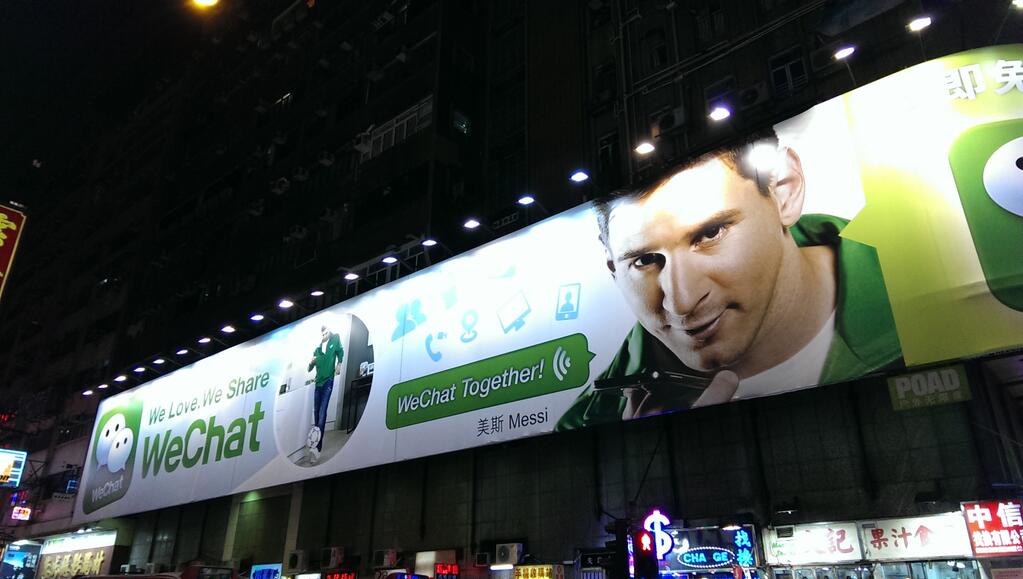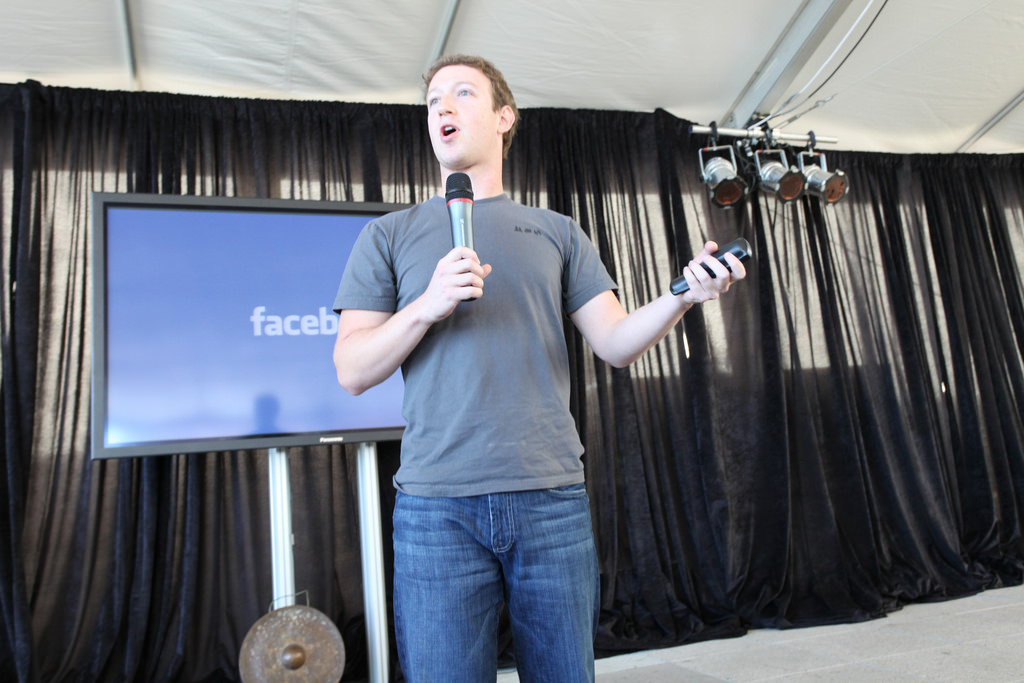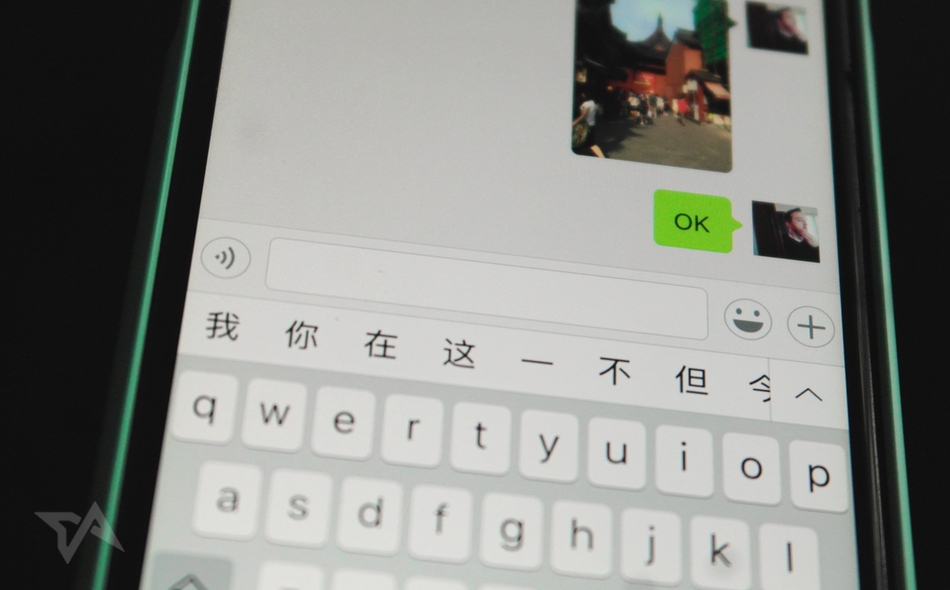
WeChat’s global expansion has been a disaster
By Steven Millward for TechinAsia
WeChat, the messaging app that’s absolutely everywhere in China, once had global ambitions. It has “great potential to be popular internationally,” said an executive at the Chinese social media giant back in the fall of 2012.
The company didn’t just sit back and hope it would happen – starting that year it went out and pushed hard so that parent company Tencent, one of China’s top web companies with a market value of US$197 billion, could have its first overseas success. WeChat dispatched marketing teams to a few strategic countries, paid for Facebook ads to woo smartphone-toting youngsters around the world, and even coughed up big bucks to get celebrities to endorse the messaging app.
By the summer of 2013, Tencent had signed up soccer star Lionel Messi to promote WeChat. He appeared in a series of online and TV ads, like this one in Brazil for Father’s Day:
There was no avoiding Messi. He popped up on huge billboards alongside the tagline “We love. We share. WeChat” – like this one in Hong Kong:

Lionel Messi’s WeChat billboard spotted in Hong Kong, July 2013. Photo credit: Engadget’s Richard Lai.
Messi was later that year joined by Brazilian youngster Neymar. With that big-hitting duo spreading the word around South America and across soccer-crazy Southeast Asia, WeChat employed different celebs for other markets it considered important, like India. Eyeing thehundreds of millions of Indian people who are shifting from flip phones to smartphones, the Chinese tech titan did the obvious Bollywood thing:
WeChat soon added a bunch of new features for overseas users – ones already doing well among Chinese users, where the app is called “Weixin” – like social gaming and official brand accounts. While Tencent kept the app’s overseas feature-set slim compared to the hundreds of things it can do in China, the company made it clear it wanted WeChat to be different from the very simple WhatsApp. It wanted to give people convenient online messaging plus a choice of using a bunch of other fun things, like paying money to download more animated “sticker” packs that could be used to enliven conversations.
But all the features, fancy footwork, and singing came to nought. Go take a bus in Bangalore or stroll the beaches of Rio and you’ll see lots of folks using WhatsApp and Facebook Messenger. Perhaps a few younger people will be swiping expertly through Snapchat; maybe a couple will be absorbed in Instagram.
WeChat? You’ll be lucky to find a soul.
Three years on from WeChat’s global push, the effort has been disastrous.
The numbers are there for proof. Looking through the top free apps – making use of AppAnnie’s collated data – on the official Android app store, Google Play, shows that WeChat is nowhere in the top 100 in Brazil. Nor in India.
Facebook’s trifecta – WhatsApp, Facebook, Facebook Messenger – are the top three on Android in India right now. In Brazil, Facebook locks in the top four with the addition of Instagram.
Facebook steamroller
Indonesia, another massive country where Tencent tried hard to make an impression, has also produced nothing for WeChat. The company started 2013 by forming a joint venture with a massive Indonesian conglomerate.

Crushing it: Facebook’s Mark Zuckerberg runs the three biggest social networks on the planet. Well, four if you count Instagram. Photo credit: Robert Scoble.
“Tencent president Martin Lau said that this is because the company needs to use a more hands-on, localized approach to reach customers here,” reported Tech in Asia from the press conference in Indonesia’ capital, Jakarta. Bolstered by Messi’s TV ads, WeChat was seeing up to 90,000 new users per day.
The race is not over by any means.
But the most popularly downloaded app on Android in Indonesia right now is BBM. Yes, BlackBerry’s messaging app. Facebook is second; WhatsApp fourth, Messenger fifth. WeChat is in the top 100 – in 97th place.
“The network effects of chat apps like WhatsApp and WeChat is what drives adoption; if your friends are users of a particular chat client, you’re more likely to use that client to stay in touch with them,” says Sarah Matthews, associate content marketing manager at US-based Jana, makers of an Android app store aimed at emerging markets.
“That’s why BBM has remained one of the most popular chat apps in Indonesia, even while users are switching from Blackberry to Android. The apps that appear first in these markets achieve critical mass within a social group and rise to the top.”
In most countries, that has benefitted Facebook hugely.
“We’ve seen how ubiquitous WeChat is in China, so the race is not over by any means, but the battle to capture more international users will be a bit tougher with already strong networks in place for its competitors,” adds Sarah.

WeChat pictured running on an iPhone.
Tencent has never revealed how many active users WeChat has outside of mainland China or in any particular country. The app’s total user base is 762 million monthly active users (MAUs), according to the company’s Q1 earnings report. Tech in Asia contacted Tencent for this story a couple of days ago but has not received a reply.
In not one single country does WeChat appear to be ahead of WhatsApp or Facebook.
So is WeChat doing noticeably well anywhere outside the confines of mainland China? AppAnnie’s rankings from Google Play show it’s the fifth most popular app right now in Malaysia – though it’s behind the Facebook triumvirate and a karaoke app. It’s also doing fine in Hong Kong – in eighth place, but once again trailing Zuckerberg’s titanic trio.
Of the 15 countries where WeChat’s Messi ad was aimed at – Argentina, Brazil, Hong Kong, India, Indonesia, Italy, Malaysia, Mexico, Nigeria, the Philippines, Singapore, South Africa, Spain, Thailand, and Turkey, points out Ad Age – the results look grim for the company. In not one single country does WeChat appear to be ahead of WhatsApp or Facebook.
And in a handful of them, like Thailand, WeChat has been beaten by Line.
But Line, made in Japan by a spin-off of Korean web company Naver, has had its own growing pains.
Line has basically flatlined since the start of 2015. Now with 218.4 million MAUs, Line has added a meager 13 million new users in the past year – while Facebook’s two apps have added hundreds of millions of new fans.
WhatsApp reached 1 billion MAUs in February, while Facebook Messenger crossed 900 million in April. They’re each adding a hundred million new active users every few months.
Despite the stagnancy, Line has solid evidence that it has actually found an audience outside of its home country. Line’s four disparate main markets – Japan, Taiwan, Thailand, and Indonesia – accounted for 69.4 percent of total MAUs in its latest figure for Q1 2016. That sounds good until you dig through Line’s older earnings reports and realise the app is increasingly dependent on those four nations. That’s called Balkanization.
All that shows WeChat is not alone in being crushed by the speeding Zuckerberg juggernaut.
For one of China’s biggest web companies, it’s back to square one in the plan to woo the world.
First appeared at TechinAsia





